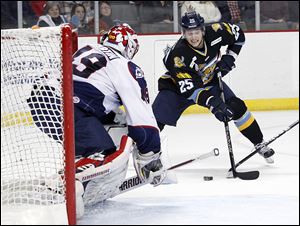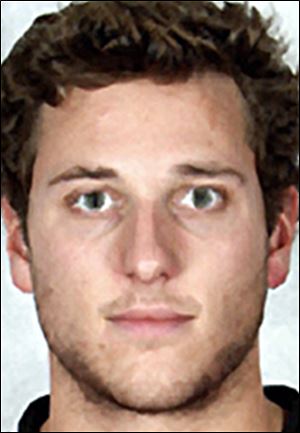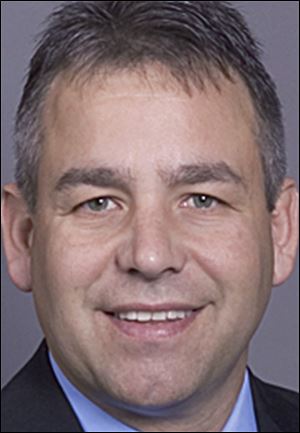
One day at a time in ECHL
Few certainties for minor league teams, players
1/15/2013
The Walleye's Ben Youds looks to shoot on Kalamazoo goaltender Joel Martin. Youds is one of several players who have been on the move since the end of the NHL lockout. The Red Wings sent him to Rockford of the AHL. Five Walleye players were sent to the AHL.
THE BLADE/ANDY MORRISON
Buy This Image

The Walleye's Ben Youds looks to shoot on Kalamazoo goaltender Joel Martin. Youds is one of several players who have been on the move since the end of the NHL lockout. The Red Wings sent him to Rockford of the AHL. Five Walleye players were sent to the AHL.
At best, the in-season life of a minor league hockey player is nomadic. At worst, it’s unstable, what with injuries and player transactions. And each time a player makes a move or is part of a transaction, a ripple effect follows.
While Ben Youds drove from Toledo to northern Illinois early last week and considered his future in professional hockey, Nick Vitucci traveled from Toledo to Florida and considered the ripple effect that the end of the NHL lockout would have on his team. Vitucci, the fourth-year Toledo Walleye coach, believed the end of the work stoppage was a positive for the sport as a whole. But as it related to overseeing his team’s roster, Vitucci took a realistic approach.
“We dreaded the day it was going to end,” Vitucci said. “We knew we were going to lose a lot of players.”
After a 2-1 shootout loss Jan. 6 to Kalamazoo at the Huntington Center, the Walleye lost five players to the American Hockey League including Youds, a defenseman whom the Chicago Blackhawks assigned to Rockford.
Those call-ups came hours after the National Hockey League and the NHL Players Association (its players union) agreed in principle to a 10-year collective bargaining agreement and just before the heart of the ECHL and AHL schedules.
“I knew I was going to be down in Toledo for a little while until the NHL got things straightened out,” Youds said.
With the start of the NHL ’s season on Saturday, it’s likely the ECHL will continue to be in flux. On Sunday alone, 18 ECHL players were either signed, released, traded, placed on or activated from reserve, or recalled by or loaned to an AHL team — including Toledo defenseman Dean Moore, who was traded to the Florida Everblades after being signed less than a week prior by the Walleye.

Youds
The Walleye have already dealt with a glut of transactions this season, whether it’s been promotions to AHL affiliates, players being returned to the ECHL, trades, or free-agent signings. Wes O’Neill became the team’s most recent departure. O’Neill, a defenseman, signed a professional tryout contract Saturday with Providence of the AHL.
Initially, Vitucci plugged holes with forward Patrick Knowlton and defensemen Moore and Tyler Miller from the Southern Professional Hockey League. The trio signed Jan. 11 with the Walleye and joined the team at the start of its three-game series against the Everblades in Estero, Fla.
When those players arrived in Toledo, they not only had to learn the nuances of a new team, but also had to acclimate to new surroundings.
Those transactions come with their own set of logistical matters for each individual player, whether he’s a short-term roster plug-in or projected as a longer-term contributor.
There’s the matter of equipment. Minor-league players tote their own gear from team to team and city to city and after his last game in Toledo, Youds packed up his own gear, got in his car and made the 5 ½-hour drive to Rockford, Ill., to join the Ice Hogs.
While teams provide uniforms, gloves, and helmets to skaters, goalies bring their own equipment, which isn’t just costly. It’s heavy (between 25-32 pounds), and it’s either left blank or customized to reflect the colors of a minor-league affiliate’s parent team.
“We’ve never had a goalie that’s matched,” Vitucci said, wryly.
Then, there’s the matter of lodging.
While many of the Walleye live in an apartment complex in Toledo, if a player joins the Walleye for a short-term stay — such as Max Nicastro, who played nine games in two separate stretches with the Walleye, before he was re-assigned Jan. 6 to Grand Rapids of the AHL — the Walleye board the players at a downtown hotel in proximity to the Huntington Center.

Vitucci
During his first stint with the Walleye in December, 2011, Youds joined the team as they were about to depart on a road trip.
“I stashed everything in a hotel room at the Park Inn,” Youds recalled, adding that he later moved into the Walleye apartment complex.
But right now, neither the Walleye nor any other ECHL team have the benefit of timing when it comes to filling roster spots or empty hotel rooms. Typically, the spring brings a new crop of free-agent players with the end of the college and Canadian major-junior hockey seasons. But in mid-January, teams aren’t just having problems finding players — right now, player agents and representatives are also facing a dearth of potential pro players.
Scott Norton, the president of Norton Sports Management, based in Laguna Beach, Calif., said in an email to The Blade that as of Tuesday afternoon he did not have any free-agent players available. Norton does not represent any of the Walleye.
Gary Prolman, the president of GMP Sports Advisory, based in Portland, Maine, said he’s fielded phone calls from minor-league teams regarding free-agent players, but like Norton, had nothing to offer prospective teams.
“The ironic twist is that with a lot of these guys, especially with NHL guys who are playing in the ECHL or in the AHL, there are log-jams everywhere else,” said Prolman, who does not represent any of the Toledo Walleye. “It’s difficult, because you have an ECHL coach who wants to keep his roster together, but he knows at any time, his team could get decimated.”
But Youds summed up a certain mind-set of operating in the minor leagues.
“Everybody takes it one day at a time,” Youds said. “There’s no set time that you’re going to be in one place.”
Contact Rachel Lenzi at: rlenzi@theblade.com, 419-724-6510 or on Twitter @RLenziBlade.